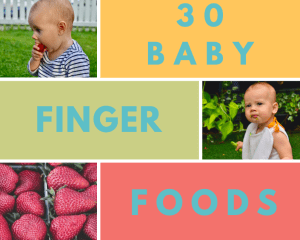7 important nutrients for babies are found plentiful in most foods, except for Vit D. Offering a good variety at mealtimes is the best way to avoid nutritional deficiencies.
Oh the exciting time of introducing solids & Nutrients for babies! It is so lovely to see babies develop their interest in food.
I recently wrote the 5 S’ of a Successful Introduction to Solids, for Kiddipedia about all the reasons a baby needs a timely and thought-through introduction to solids.
Parents are of course very aware of how important nutrients are for babies, as they introduce solids. The purpose of this piece is to reiterate that good all-round nutrition starts with offering a good variety of food to babies.
So keep seeing the Forest From the Trees: offer variety! Always visit your GP or paediatrician, if you are concerned about nutritional deficiencies. It is better to check before supplementing. Overall most nutrients babies need are better absorbed from foods. With all foods, parents must pay attention to the risk of allergies as well as choking. The advice hereafter is general in nature.
If you are interested in baby-led weaning, this ebook is available to you: it’s free to download.

In the meantime here are the:
7 important nutrients for babies:
Iron:
Around 6 months of age, a baby’s iron stores are depleted, particularly if mum was low on iron herself or if the baby was premature.
Role: growth and formation of healthy blood cells. Iron is critical for oxygen to be carried around the body, at a time of intensive growth for a baby.
Iron-deficiency anaemia may impact neuromotor development. Babies with an iron deficiency may be less physically active and develop more slowly[1].
Sources:
Non-heme iron:
➤ fortified cereals, such as rice cereals.
➤ pureed tofu
➤ pureed legumes, lentils and beans.
➤ eggs
Always have some fresh soft fruit/veggies on offer as well, as Vit C is essential for non-heme iron absorption.
Heme iron
➤ Meat, Poultry,
➤ Fish
Vit C:
Breastmilk and infant formula contains some Vit C. The body does not make Vit C, so it is best to offer Vit C rich food every day.
Role: Vit C is an anti-oxidant, it supports immune function. It helps with the absorption of iron. It is essential for bone and blood vessel health.
Deficiency: in infants/children may result in symptoms such as irritability, pain during movement, anorexia, and slowed growth. In infants and children, bone growth is impaired, and bleeding and anaemia may occur. A rare condition called Scurvy may develop as a result of a lack of Vit C. In 2016 it was documented in some Australian adults.
Sources: Vitamin C is light and heat sensitive, it also dissolves in water. So fresh (and ripe) fruit and vegetables are the best sources.
➤ Fresh fruit and vegetables
Vit D:
Vit D is mostly obtained through some degree of exposure to the sun, the body can. There are small amounts of Vit D in butter, margarine and mushrooms for examples.
It is worth discussing Vitamin D injections with babies who do not get any sun or are fully covered in clothing, those who are born prematurely, those with dark skin. Mums who breastfeed initially provide some Vit D stores to babies, however, this also depends on their own levels of Vit D. It is always worth asking your doctor.
Role: muscle and bone health. Vit D helps with the absorption of calcium.
Deficiency: Children who lack Vit D may complain or muscle pain, babies who lack Vit D may experience seizures. A severe deficiency may cause delayed dentition and rickets,
Calcium:
Babies get plenty of calcium through formula or breastfeeding, which they can absorb well if they have sufficient Vit D. It is recommended that throughout childhood children are served some calcium on 2 to 3 servings per day.
Those with lactose intolerance or milk protein allergy may need alternatives, as per the recommendation of their GP or paediatrician.
Role: the growth of strong bones and teeth.
Deficiency: a deficiency in calcium may result in rickets in growing children, and osteoporosis in older age.
Sources of Nutrients for babies:
➤ Dairy products (best-absorbed source of calcium)
➤ Green leafy vegetables
➤ Sardines (with bones)
➤ Salmon (with bones)
➤ Almonds
➤ Fortified soy drinks
Vit A:
It is rare to have a deficiency in Vit A in developed countries. In September 2019, a British teenage boy made the news as, sadly, he developed blindness, due to eating an extremely limited diet of fries and chips.
Role: Vit A is important for good eyesight, healthy skin and teeth as well as immune function.
Deficiency: Blindness, severe infections and mortality.
Source: Animal sources contain formed Vit A, the body can make Vit A, from pro-vitamin A. Any Vit A supplementation has to be supervised by a professional, as high levels are toxic.
Vit A:
➤ Liver and fish oils
➤ Eggs.
➤ Fortified cereals
Provitamin A:
➤ green leafy vegetables
➤ orange and yellow vegetables
➤ Tomato
➤ Fruit
Choline:
This Vitamin like compound has become the focus of recent research years as an essential nutrient for babies especially. Choline is water-soluble so think twice about cooking veggies that contain it.
Role: Choline plays a critical role in fetus development. Choline is important for cell membranes. Choline is also important for the development of the central nervous system.
Deficiency: in adults choline deficiency is associated with fatty liver, liver damage and muscle damage. Studies are looking to clarify the relationship between choline intakes and cognitive function and determine whether choline supplements might benefit patients with Alzheimer’s disease or other forms of dementia.
Sources:
➤ eggs,
➤ liver,
➤ meat, poultry,
➤ fish,
➤ cruciferous vegetable
➤ peanuts
➤ dairy products
➤ soybeans
DHA
or Docosahexaenoic acid is an omega 3 fatty acid.
Role: it is essential for normal vision and brain development.
Deficiency: studies are looking to clarify the potential roles of DHA in the mechanisms of Alzheimer’s disease.
Sources of Nutrients for babies:
➤ cold-water fish,
➤ mackerel,
➤ sardine,
➤ herring,
➤ tuna,
➤ halibut,
➤ salmon,
➤ cod liver,
➤ It can also be made by algae.
Hopefully, you are now convinced that variety is key to providing the nutrients babies need. It’s important not to panic if your child needs time to learn about the new food you introduce. The worst thing would be to reduce the range you offer based on today’s refusal. Instead, keep an eye on how well your child is developing their eating skills, ensure that you are modelling eating yourself. Here you will find my 7 keys to successfully introduce solids to babies
Sources:
https://www.rch.org.au/kidsinfo/fact_sheets/Vitamin_D/
https://www.sbs.com.au/food/article/2018/02/08/choline-little-known-nutrient-its-benefits-our-health-are-huge
https://ods.od.nih.gov/factsheets/Choline-HealthProfessional/
Long-Term Developmental Outcome of Infants with Iron Deficiency
Betsy Lozoff, M.D. et Al.
September 5, 1991
N Engl J Med 1991; 325:687-694
DOI: 10.1056/NEJM199109053251004




